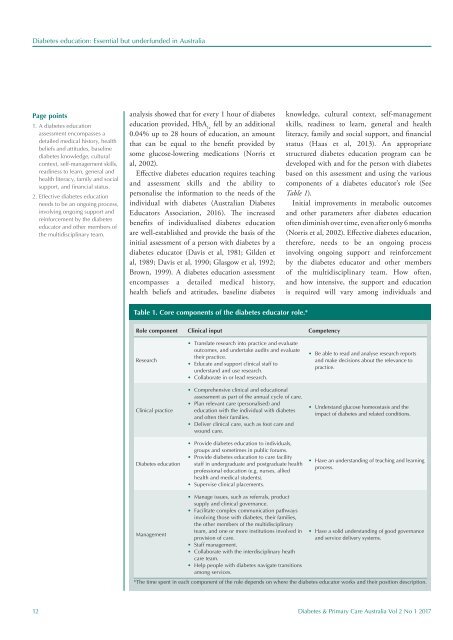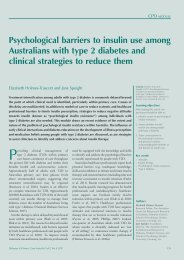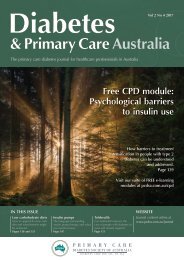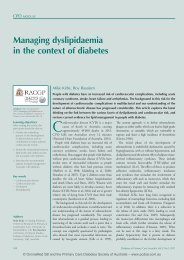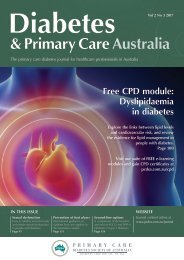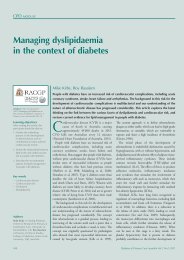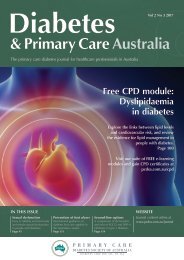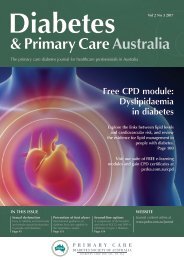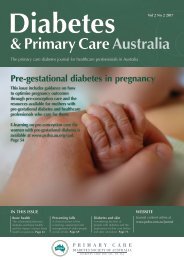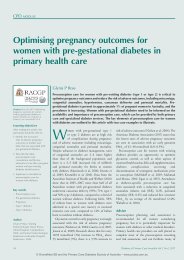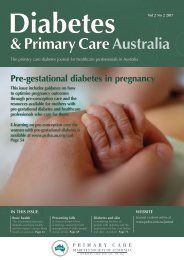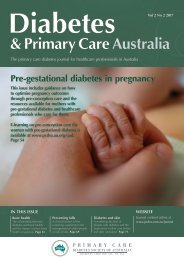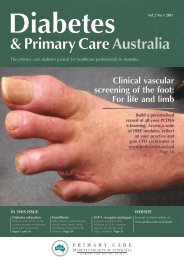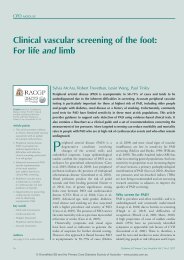DPCA2-1
You also want an ePaper? Increase the reach of your titles
YUMPU automatically turns print PDFs into web optimized ePapers that Google loves.
Diabetes education: Essential but underfunded in Australia<br />
Page points<br />
1. A diabetes education<br />
assessment encompasses a<br />
detailed medical history, health<br />
beliefs and attitudes, baseline<br />
diabetes knowledge, cultural<br />
context, self-management skills,<br />
readiness to learn, general and<br />
health literacy, family and social<br />
support, and financial status.<br />
2. Effective diabetes education<br />
needs to be an ongoing process,<br />
involving ongoing support and<br />
reinforcement by the diabetes<br />
educator and other members of<br />
the multidisciplinary team.<br />
analysis showed that for every 1 hour of diabetes<br />
education provided, HbA 1c<br />
fell by an additional<br />
0.04% up to 28 hours of education, an amount<br />
that can be equal to the benefit provided by<br />
some glucose-lowering medications (Norris et<br />
al, 2002).<br />
Effective diabetes education requires teaching<br />
and assessment skills and the ability to<br />
personalise the information to the needs of the<br />
individual with diabetes (Australian Diabetes<br />
Educators Association, 2016). The increased<br />
benefits of individualised diabetes education<br />
are well-established and provide the basis of the<br />
initial assessment of a person with diabetes by a<br />
diabetes educator (Davis et al, 1981; Gilden et<br />
al, 1989; Davis et al, 1990; Glasgow et al, 1992;<br />
Brown, 1999). A diabetes education assessment<br />
encompasses a detailed medical history,<br />
health beliefs and attitudes, baseline diabetes<br />
knowledge, cultural context, self-management<br />
skills, readiness to learn, general and health<br />
literacy, family and social support, and financial<br />
status (Haas et al, 2013). An appropriate<br />
structured diabetes education program can be<br />
developed with and for the person with diabetes<br />
based on this assessment and using the various<br />
components of a diabetes educator’s role (See<br />
Table 1).<br />
Initial improvements in metabolic outcomes<br />
and other parameters after diabetes education<br />
often diminish over time, even after only 6 months<br />
(Norris et al, 2002). Effective diabetes education,<br />
therefore, needs to be an ongoing process<br />
involving ongoing support and reinforcement<br />
by the diabetes educator and other members<br />
of the multidisciplinary team. How often,<br />
and how intensive, the support and education<br />
is required will vary among individuals and<br />
Table 1. Core components of the diabetes educator role.*<br />
Role component Clinical input Competency<br />
Research<br />
Clinical practice<br />
Diabetes education<br />
• Translate research into practice and evaluate<br />
outcomes, and undertake audits and evaluate<br />
their practice.<br />
• Educate and support clinical staff to<br />
understand and use research.<br />
• Collaborate in or lead research.<br />
• Comprehensive clinical and educational<br />
assessment as part of the annual cycle of care.<br />
• Plan relevant care (personalised) and<br />
education with the individual with diabetes<br />
and often their families.<br />
• Deliver clinical care, such as foot care and<br />
wound care.<br />
• Provide diabetes education to individuals,<br />
groups and sometimes in public forums.<br />
• Provide diabetes education to care facility<br />
staff in undergraduate and postgraduate health<br />
professional education (e.g. nurses, allied<br />
health and medical students).<br />
• Supervise clinical placements.<br />
• Be able to read and analyse research reports<br />
and make decisions about the relevance to<br />
practice.<br />
• Understand glucose homeostasis and the<br />
impact of diabetes and related conditions.<br />
• Have an understanding of teaching and learning<br />
process.<br />
Management<br />
• Manage issues, such as referrals, product<br />
supply and clinical governance.<br />
• Facilitate complex communication pathways<br />
involving those with diabetes, their families,<br />
the other members of the multidisciplinary<br />
team, and one or more institutions involved in<br />
provision of care.<br />
• Staff management.<br />
• Collaborate with the interdisciplinary heath<br />
care team.<br />
• Help people with diabetes navigate transitions<br />
among services.<br />
• Have a solid understanding of good governance<br />
and service delivery systems.<br />
*The time spent in each component of the role depends on where the diabetes educator works and their position description.<br />
12 Diabetes & Primary Care Australia Vol 2 No 1 2017


